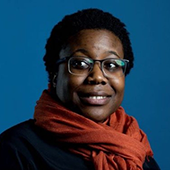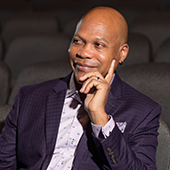At the heart of Black queer studies
School of Communication faculty explore facets of communication through artistic, scientific, and social scientific perspectives. This Winter 2023 issue of Dialogue features an edited conversation between E. Patrick Johnson, dean and Annenberg University Professor, and Moya Bailey, associate profressor of communication studies.
 "I really appreciate how Patrick’s work is so explicit in saying that it is about Black queer people and Black queer Southerners. That was one thing that gave me permission to follow my research: scholars like him who do their work so unapologetically and so beautifully. I also really admire the heart at the center of his work. That’s something that I strive to have in my work as well: people. And that comes through in everything he does. His work was a real model for me as a graduate student in queer Black studies. As with Patrick, a lot of my work is based in experience and in seeing some of the stories around me that don’t get lifted up and don’t get shared."
"I really appreciate how Patrick’s work is so explicit in saying that it is about Black queer people and Black queer Southerners. That was one thing that gave me permission to follow my research: scholars like him who do their work so unapologetically and so beautifully. I also really admire the heart at the center of his work. That’s something that I strive to have in my work as well: people. And that comes through in everything he does. His work was a real model for me as a graduate student in queer Black studies. As with Patrick, a lot of my work is based in experience and in seeing some of the stories around me that don’t get lifted up and don’t get shared."
— Moya Bailey, associate professor of communication studies
 "My recent books Black. Queer. Southern. Women. and Honeypot both came out of my desire to provide a platform for Black Southern queer women, who I think haven’t been given enough space. Moya’s notion of misogynoir, focused on the misogyny that Black women experience, was an impetus for an oral history that would allow them to talk about those specific experiences. For instance, one thing that really surprised me was that even though I share their regional and racial identity, the gender difference is real. Talking to these women about their experiences was really humbling for me, because it goes at the heart of misogynoir. One specific example is the extent to which Black women are subjected to sexual violence. It was devastating to hear those stories over and over and over again about sexual trauma and sexual violence, specifically at the hands of Black male relatives. So in those specific ways, I see Moya’s work as critical to the work that I do."
"My recent books Black. Queer. Southern. Women. and Honeypot both came out of my desire to provide a platform for Black Southern queer women, who I think haven’t been given enough space. Moya’s notion of misogynoir, focused on the misogyny that Black women experience, was an impetus for an oral history that would allow them to talk about those specific experiences. For instance, one thing that really surprised me was that even though I share their regional and racial identity, the gender difference is real. Talking to these women about their experiences was really humbling for me, because it goes at the heart of misogynoir. One specific example is the extent to which Black women are subjected to sexual violence. It was devastating to hear those stories over and over and over again about sexual trauma and sexual violence, specifically at the hands of Black male relatives. So in those specific ways, I see Moya’s work as critical to the work that I do."
— E. Patrick Johnson, Dean of the School of Communication and Annenberg University Professor
 "I was online as a graduate student and even earlier—I built my own website when I was in high school. Then in college I started using LiveJournal and other digital platforms. I found myself connecting with a community of people moving from platform to platform—we called ourselves radical Women of Color bloggers. And then each of us used these platforms and experienced a lot of negativity. That’s partly how I started to think through misogynoir—as something that people were experiencing. So in graduate school I had the idea of connecting my scholarly pursuits with this other work I was doing online."
"I was online as a graduate student and even earlier—I built my own website when I was in high school. Then in college I started using LiveJournal and other digital platforms. I found myself connecting with a community of people moving from platform to platform—we called ourselves radical Women of Color bloggers. And then each of us used these platforms and experienced a lot of negativity. That’s partly how I started to think through misogynoir—as something that people were experiencing. So in graduate school I had the idea of connecting my scholarly pursuits with this other work I was doing online."
 "I love the multimodal components of Moya’s work. It takes multiple methods and modes of communication to share and disseminate the kind of research that she and I are doing—whether traditional books, academic conferences, platforms like Black Twitter, or readings where Black women just gather in a space to sit and be with each other."
"I love the multimodal components of Moya’s work. It takes multiple methods and modes of communication to share and disseminate the kind of research that she and I are doing—whether traditional books, academic conferences, platforms like Black Twitter, or readings where Black women just gather in a space to sit and be with each other."
 "Part of E. Patrick’s vision for the school comes from a performance background that is very much based in how we interact with each other. Communication can be data-driven and quantitative, but the qualitative is really what drives our desire to communicate with each other and what holds it all together. Even as people are doing their data-driven, digital work, there’s interest in thinking about what this means for people. I’ve already encountered graduate students in the more data-driven, digital side of the school who understand how essential it is to connect to those qualitative methods."
"Part of E. Patrick’s vision for the school comes from a performance background that is very much based in how we interact with each other. Communication can be data-driven and quantitative, but the qualitative is really what drives our desire to communicate with each other and what holds it all together. Even as people are doing their data-driven, digital work, there’s interest in thinking about what this means for people. I’ve already encountered graduate students in the more data-driven, digital side of the school who understand how essential it is to connect to those qualitative methods."
 "Moya is the future of the field as I perceive it. She’s a fierce theorist in the traditional sense, but she’s also a community activist who is able to translate theory into practice on the ground where it matters. So many scholars are interested in the theory but not in how the theory impacts the social justice initiative they’re involved in, or in how the discourse happening on the ground is also a form of theory. That translation has to come from the bottom up but most often is just being imposed from the top down. My hope is that we can transform the School of Communication by bringing together a cadre of scholars, practitioners, artists, and thinkers who think broadly about the communication arts and sciences—taking ethnic, racial, gender, and sexual diversity into consideration but also diversity of mind and diversity of thought."
"Moya is the future of the field as I perceive it. She’s a fierce theorist in the traditional sense, but she’s also a community activist who is able to translate theory into practice on the ground where it matters. So many scholars are interested in the theory but not in how the theory impacts the social justice initiative they’re involved in, or in how the discourse happening on the ground is also a form of theory. That translation has to come from the bottom up but most often is just being imposed from the top down. My hope is that we can transform the School of Communication by bringing together a cadre of scholars, practitioners, artists, and thinkers who think broadly about the communication arts and sciences—taking ethnic, racial, gender, and sexual diversity into consideration but also diversity of mind and diversity of thought."
